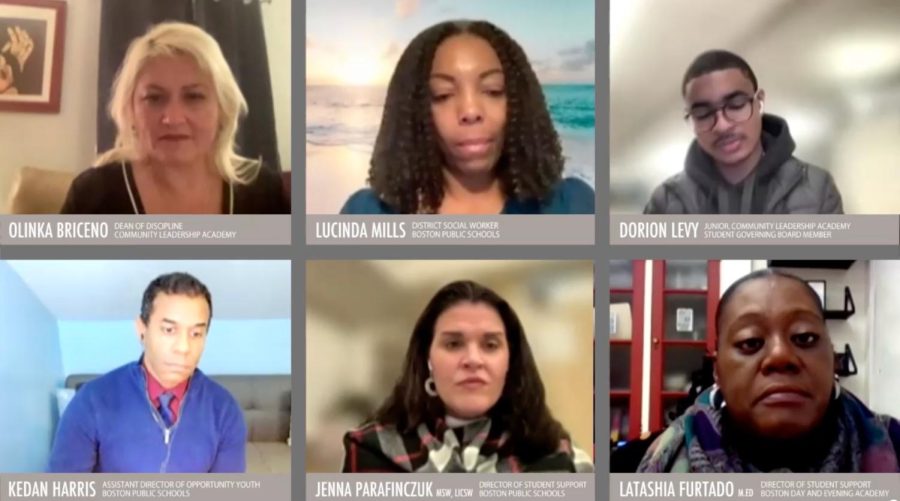Center on Crime, Race and Justice hosts forum on trauma-informed services
Panelists at the Crime, Race and Justice online forum Nov. 29. Attendees heard from speakers about how Boston Public Schools is addressing student needs in a trauma-informed school system. Photo courtesy of The Center on Crime, Race and Justice.
December 4, 2022
The Center on Crime, Race and Justice within the College of Social Sciences and Humanities hosted the third annual Race and Community Dialogue Series, “A Community Forum on Trauma Informed Services Within Boston Public Schools,” Nov. 29.
Boston Public Schools, or BPS, social worker Lucinda Mills and BPS Leadership, Development and Senior Advisor and Dean of Discipline Olinka Briceno moderated the event. Panelists included Latashia Furtado, the director of student support at Boston Day and Evening Academy; Kedan Harris, BPS assistant director of opportunity youth; Dorion Levy, a junior at the Boston Community Leadership Academy and member of the Student Governing Board; and Jenna Parafinczuk, a director of student support at BPS.
The Zoom event took place from 5 to 6:30 p.m. and was open to the public. Lisa Laguerre, the director of community relations at the Center on Race, Crime and Justice, or CRJ, at Northeastern, said over 100 people were in attendance, and that forums are purposely conducted over Zoom so it is accessible to everyone in the Northeastern and Greater Boston communities.
The forum was organized with assistance from the CRJ’s community advisory board, founded in 2003. It was part of the larger Race and Community Dialogue series, which is in its third year and will have two more events this year both focused on trauma.
“We’ve just been very fortunate to find a group of practitioners that are willing to work with us to make sure that the research that we do is helpful in terms of helping them to advocate on the ground level around legislation and policies related to race and justice issues,” said Laguerre in an interview with The News. “They’re central in helping us to put together these forums and to create spaces where academics and community practitioners can come together and discuss these issues.”
After a round of introductions, the moderators began asking questions, starting with exploring what a trauma-informed school system looks like. Furtado discussed how Boston Day and Evening Academy, a charter school in Roxbury, is working to dismantle white supremacy present in the social systems and education systems. As the director, she works with the school psychologists and social workers to build relationships with students and address students holistically.
Speaking from her longtime experience with BPS, Harris said since the school is the most “consistent” space for students, having a support network there is really important.
“Relationships are huge,” Harris said. “The environment [must be] responsive to [students’] hopes and dreams that they can see a pathway to themselves to what it is that they want to achieve.”
Levy, an aspiring future lawyer, spoke about the inherent trauma of being a young Black or brown person.
“Students are scared to go out because they’re scared that something is gonna happen to them,” Levy, the student, said. “They can’t live a normal life without being in fear.”
Levy spoke to the way events reported on in the news and society’s stereotyping of people of color have contributed to this trauma and hopes more school social workers and psychologists can provide opportunities to address it.
“Who can I sit down with to talk about these issues? Who can I talk about this fear with?” Levy said.
The forum touched upon ways school systems try to help students, whether it is through de-escalation techniques or spaces, family nights to build support networks or providing translators to parents. Parafinczuk, a BPS social worker, spoke about a program implemented during COVID-19 in which BPS employees delivered breakfast to students who weren’t in school to show how much they care for students individually.
Throughout the forum, panelists consistently emphasized the importance of building trust with families. Levy saw transparency as one of the most important things schools can do to maintain relationships with families. Parafinczuk and Furtado spoke about different events the schools host such as game nights, raffles, school spirit weeks and culture weeks.
Laguerre said the staff at the CRJ were very pleased with how the forum went and that the next one, held in February, will focus on how to address community trauma.
“We felt like we had a wonderful panel lineup [of] people who are experienced and devoted to wanting to service youth and families within the school district,” Laguerre said. “We got some wonderful questions from the audience and were able to really engage the panelists around some of the questions that were brought up from them.”







